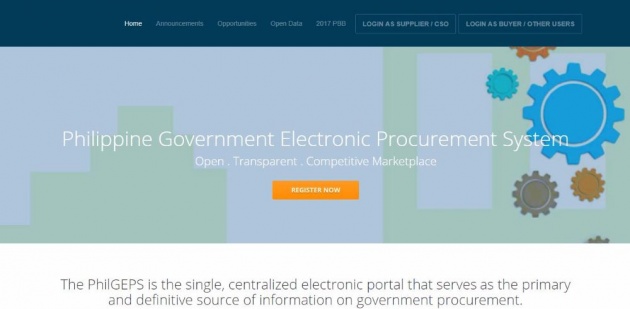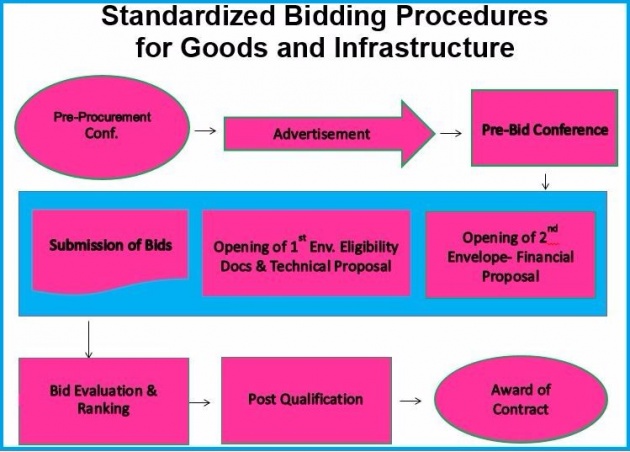Video Credits: PhilGEPS Official via YouTube
A government official or employee may be held liable for any unauthorized spending regardless of the amount. Because that money is owned by the people.
Whether we are working in a private company or government office, we have the obligation to pay taxes. Same thing if we have a business or in a practice of a profession. Paying taxes is our social responsibility. Read more about taxes from An Introduction to the Philippine's Tax Reform For Acceleration Inclusion (TRAIN).

Image Credits: Nattanan23 via Pixabay
The money collected from our taxes will form part of the national treasury and will be returned to us in the form of goods, services, infrastructure projects or facilities and consulting services. We gained benefit from having wider and roads, stronger bridges, hospitals, schools for our children and other facilities for the general welfare of the people. Being a taxpayer or an ordinary resident of the country, we have the right to know where our taxes go.

Image Credits: MaikBarth via Pixabay
Part of the obligation of the government is to provide fast and efficient services to the people. Thus, part of our taxes will be used for the salaries and wages of the government workers who are providing services. Other portion shall be used to purchase amenities, materials and other necessary things in order to give the people the best services due for them.

Image Credits: sasint via Pixabay

Image Credits: 12019 via Pixabay
Government Procurement
Under Section 2 of the Implementing Rules and Regulations of Republic Act No. 9184, otherwise known as the Government Procurement Reform Act, it is the policy of the Government of the Philippines that procurement of Goods, Infrastructure projects and consulting services shall be competitive and transparent, and therefore shall undergo competitive bidding, except as provided in Rule XVI of the IRR (Section 2. Declaration of Policy - Revised IRR of RA 9184).
Government offices including the national government agencies, departments, bureaus or government-owned and controlled corporations and the local government units such as the provincial government, cities, municipalities and the barangays are allowed to procure or acquire the necessary tools or materials, equipment, or even services in order to strengthen their capacities and to be fully equipped so that they may improve further the services they are giving to the people.
We need to conduct trainings, we need to build infrastructures, we need to purchase office supplies, vehicles, fuel and other things necessary for the effective and efficient performance of our jobs. But let it be known that we cannot just spend the money of the people without following the proper procedure.
All of these and other related things are specified in the Republic Act 9184 or known as The Government Procurement Reform Act.
Any misuse, misappropriations, and misspendings of public funds is strictly prohibited by law
Governing Principles of the Government Procurement
Section 3 of the IRR of the Procurement Law or Republic Act 9184 provides that the procurement of the government should be guided by the following principles:
>>>Transparency<<<
Transparency in the procurement process can be achieved if the whole process is in compliant with the law. Procurement process should not be dependent on few individuals which means that the opportunity should be spread out so that everyone could be given chance to transact business with the procuring entity. The opportunity should be widely broadcasted so that the people from different sectors are given equal chances to transact business.
>>>Competitiveness<<<
Competitiveness means giving equal opportunity to all eligible individuals or group to participate in the bidding process. This would spread out the chances to a wider group of people rather being concentrated on a few.
>>>Streamlined Process uniformity<<<
The process should not be complicated rather, be simple and can be easily followed even by an ordinary audience. Adapting to new technology should not be difficult but an avenue to a fair and stress-free system.
>>>System of Accountability<<<
This refers to the system wherein the government official involved should be held liable for their actions relative to such purchase. Likewise, the process should be monitored by the public to make sure that it follows the procurement law.
Source of Information (THE 2016 REVISED IMPLEMENTING RULES AND REGULATIONS OF REPUBLIC ACT NO. 9184, OTHERWISE KNOWN AS THE GOVERNMENT PROCUREMENT REFORM ACT)
As a general rule, all procurement process should be done in a competitive manner. Meaning, the process must be open to participation by any interested party adopting the following process: advertisement, pre-bid conference, eligibility screening of prospective bidders, receipt and the opening of bids, evaluation of bids, post-qualification and awarding of a contract. This is referred to as "Competitive Bidding" or "Public Bidding".
Part of the process in procurement is the posting of advertisement which signals the start of the bidding process and the availability of the bidding documents to the prospective buyer. Posting of advertisement should be done in newspaper, website, Philgeps and conspicuous places.
For the amount of Approved Budget for the Contract (ABC) amounting to less than 10,000,000.00 for goods, 15,000,000.00 for the procurement of infrastructure projects and 5,000,000 for the procurement of Consulting Service, posting in a newspaper in general circulation shall not be required.
Instead, they can use the Philippine Government Electronic Procurement System (PhilGEPS)
The Philippine Government Electronic Procurement System (PhilGEPS)

Image source: Actual Home Page of PhilGEPS
This is an online system which serves as a gateway for both the procuring entity (buyer) and the supplier. The use of information and communication technology is one way to promote transparency and efficiency in the procurement process thus, the use of PhilGEPS is one way to ensure that these are achieved.
With its user-friendly interface, PhilGeps is a great way to post procurement of goods, infrastructure, and services as per requirement of RA 9184. Please click HERE for the step-by-step guide in using the PhilGEPS.
One example of procurement of service is for catering services being offered alongside with the conduct of a training, The bidding process may upon receipt of the training design, should be examined by the Bids and Awards Committee of the office concerned. A pre-procurement meeting, to be called upon by the BAC Secretariat must be conducted and posting must comply with the 3-day policy s set forth in the Philippine Procurement Act.
Every government office and all the local government units are mandated by law to create their own PhilGEPS account. Likewise, independent contractors and other private entities are also encouraged to do the same. All procurements amounting to more than Php 50,000 shall be posted on the portal.
On the fourth day, the opening of bids should be conducted. The 'lowest responsive bidder' shall be selected from among the companies or business representatives. Post qualification shall be conducted and finally, the awarding of bids must be done.
Here is a graph of the Standardized Bidding Procedures for Goods and Infrastructure.
Video Credits: Layfon Wolfstein Alseif via YouTube

Image Credits: Sharon Lopez via Bitlanders
Being transparent in all government transactions is one of the ways in achieving a more developed and responsive government.
===
Thank you for reading.
Please visit my blog for more articles.
Sharon Lopez is a graduate of Bachelor of Science in Commerce Major in Banking and Finance and currently working in the government handling programs on Business Friendly and Competetive LGUs.
You may visit me on Facebook,
******************************************************************************************************************************
Disclaimer: The views and opinions expressed in this blog post are that of the author and does not in any way represent the agency or department she currently belongs.



